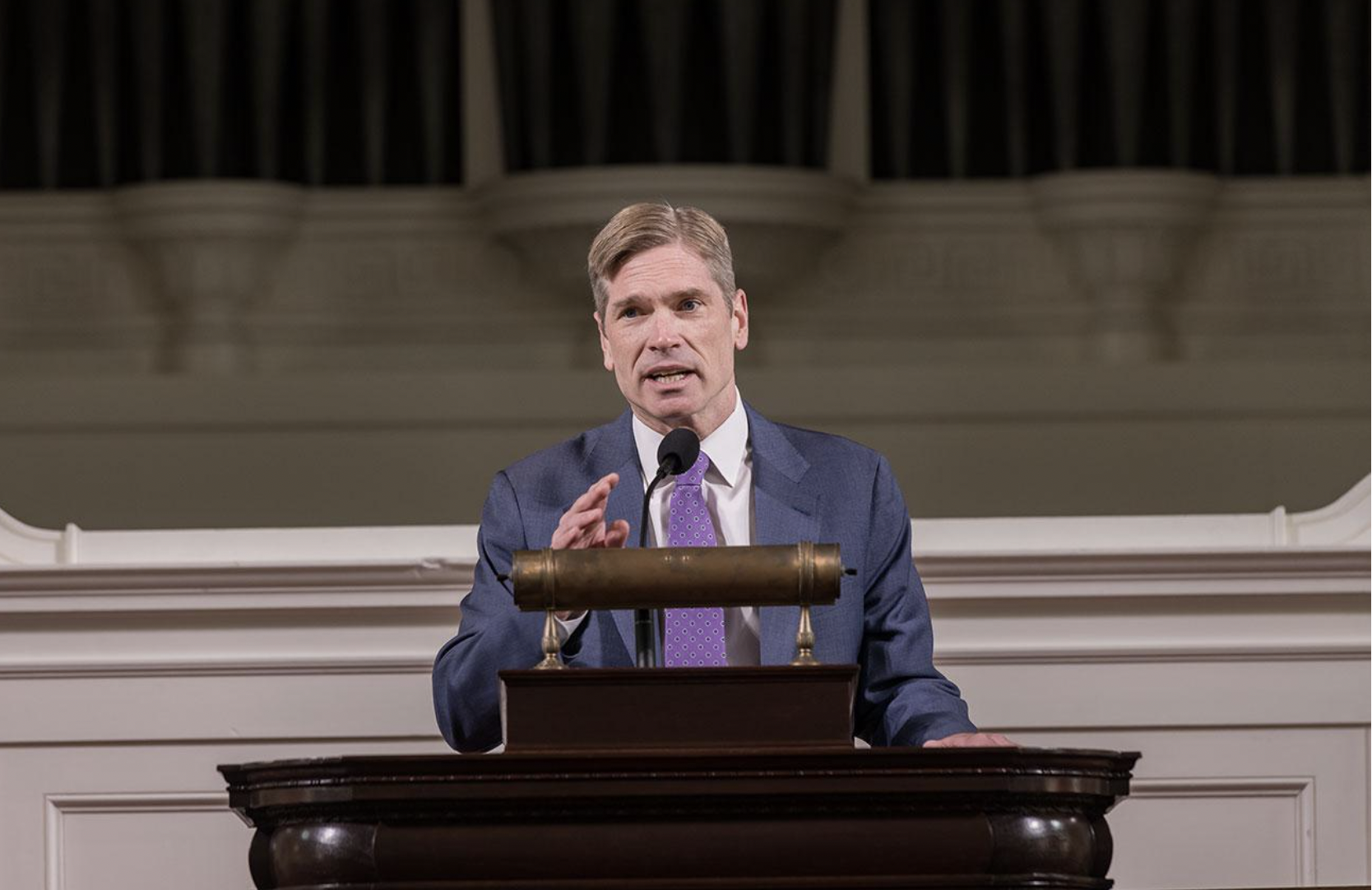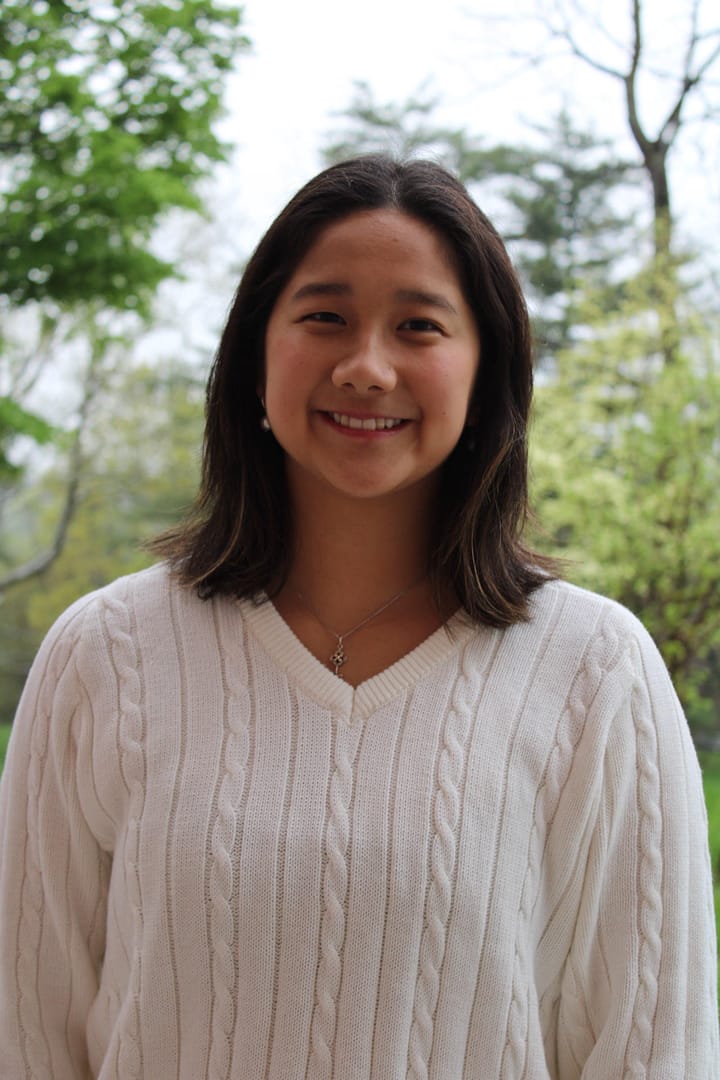Elliott Addresses Fears Surrounding Academic Freedom
Amid ongoing fears surrounding federal intervention in higher education, Editor-in-Chief June Dorsch ’27 spoke with President Michael Elliott about the roots of these attacks and how Amherst will be affected by the current administration’s agenda.

The start of President Donald Trump’s second term has brought growing federal intervention in higher education and increased concerns about preserving academic freedom. The Trump administration has revoked international faculty and student visas and detained students affiliated with pro-Palestinian activism. As of Tuesday, the Trump administration has threatened or planned to pull federal funding from seven universities for what it has deemed inadequate responses to antisemitism on campuses. Conditions for restoring funds have included new rules designed to reduce student protests in support of Palestine, such as increasing college police presence and banning mask-wearing for the purpose of hiding identity at protests, and unprecedented government interventions into academic program administration.
Last month, Columbia University agreed to all of Trump’s requirements in order to retain 400 million dollars in funding, garnering headlines and prompting fears among other colleges and universities, who have worried that this resolution sets a dangerous precedent. On March 24, President Michael Elliott sent an email to the Amherst community committing to protecting academic freedom. The Student interviewed Elliott to further understand the college’s position on federal intervention in higher education, academic freedom, and protecting students, faculty, and staff.
A History Beyond Trump
Elliott said that he has never seen governmental interventions at colleges and universities “at this particular scale … during my lifetime.” However, he emphasized that the current attacks on academia have roots that go beyond the Trump administration.
For example, on March 10, the Department of Education notified 60 colleges and universities that they were under investigation for failing to protect Jewish students on their campuses. Elliott pointed out that all these institutions previously had Office of Civil Rights complaints — reports of discrimination in an educational setting submitted to the federal government — during the Biden administration.
“I really do think … that while the Trump administration may be willing to take more dramatic action, the sentiments and the mistrust of higher education preceded this president and this Congress, and I was worried about these issues before the election,” Elliott said.
He viewed Trump’s newest interventions as part of a broader governmental response to distrust in higher education. In 2023, trust in higher education hit an all-time low, with a Gallup poll finding that only 36% of Americans had “a great deal” or “quite a lot” of confidence in these institutions — a 20% decrease from 2015. Elliott said he believes this is due to ballooning tuition costs and perceptions of colleges as reinforcing economic inequity and acting as sites of political indoctrination, among other reasons.
While he said he wished national media organizations portrayed colleges and universities in a more positive light, Elliott also felt that these institutions needed “to tell the story better, of what actually goes on on a college campus” to the public.
“When you bring people here, they get to spend time in the classrooms. They get to spend time with students. They get to hear the stories of students … They emerge with a very different picture than if they just read about higher education,” Elliott said. “We can’t bring the entire American public right onto our campus, so we have to figure out how to get the story of what we do out to them.”
Amherst’s Risk for Targeting
In his March 24 email, Elliott said that about 1% of the college’s operating budget comes from federal grants and other forms of funding. That means that Amherst does not have the same financial threat if targeted by the Trump administration. In addition, Elliott wrote that “We believe that our programs and practices already comply with federal nondiscrimination law, and we will continue to ensure that this remains true.”
That does not mean that there is nothing at stake on Amherst’s campus.
While Amherst is not a research university, cuts in research grants and funding still have “fairly direct material impact on students,” such as graduate schools rescinding admissions or reducing aid to Amherst students who are graduating this May.
International members of the community have grown increasingly afraid as the Trump administration has terminated visas without notice and arrested international students who have expressed support for Palestine. The detainment of Rümeysa Öztürk — which seems to be based on an op-ed she co-wrote for the Tufts student newspaper urging college leadership to “engage with and actualize” student senate resolutions in support of Palestine — has stoked fears that expressing political opinions in writing, including in newspapers and social media content, is now dangerous unless one is a U.S.-born citizen.
Elliott also addressed in his email that “Faculty and staff have expressed worries that their work could be the next subject of attack or investigation—fears that chill the freedom of inquiry.”
The college has taken several steps in collaboration with other higher education institutions to combat federal interventions that target academic freedom. It is part of several higher education associations that are advocating for many policy reforms, including ones around academic freedom, and is part of the Presidents’ Alliance on Immigration and Higher Education to coordinate effective responses to protect international members of their communities.
Many of these coalitions include institutions that are facing very different challenges from Amherst. Various research universities have lost funding after the National Institutes of Health terminated active grants related to diversity, equity, and inclusion (DEI) and queer issues. In addition, public institutions have different limitations and structures than private institutions do. Still, he found that collective efforts are essential, as federal action towards one university has ramifications for all of higher education.
“It is an ecosystem [and] we actually share more in common than divides us,” Elliott said. “Things that are damaging to higher education in any one sector pull us back in our larger goals. We do what we do at Amherst College, not just for the honor and glory of Amherst College, but because we believe it serves society, and we believe that other institutions also serve society.”
Elliott also committed to directing college resources to protect the First Amendment rights of Amherst faculty, staff, and students.
“One of the reasons we have the kind of time, place, manner restrictions on protests is because we believe those restrictions allow us to protect that right to protest,” Elliott said. “Certainly publishing in The Student or other newspapers also falls under that [protection] and we do have resources that … we can call upon.”
(The Faculty Executive Committee is currently reviewing an amendment to the Amherst College Statement of Academic and Expressive Freedom that would formalize the commitment to using college resources to protect faculty members’ academic freedom.)
Elliott said that there are limits to how the college could protect community members’ safety, especially when it comes to risks from an individual’s digital footprint.
“[Digital safety] is not the kind of safety we can provide, but we will use our resources to preserve the physical safety of students.”
He also noted that staff and faculty have different types of rights when it comes to expressive freedom. When a faculty member states an opinion they are not speaking on behalf of the college, but are independent. However, college staff are speaking as a representative of the institution. As a result, though the college will “vigorously … use our legal resources to protect the work” of both faculty and staff, faculty have more academic freedom protections.
Ongoing Fears
None of the actions the college is taking will completely eradicate community members’ anxieties.
Elliott said that he wished he could assuage fears, but that certain things were out of his control: “I can’t tell students [and members of the community] not to be afraid. That’s foolish, right? Or at least that’s really not my role.”
However, he did emphasize that there are several factors innate to Amherst that shield the community from federal interventions.
“We have a clear commitment to our mission. We have wonderful people [who] are committed to that mission. We do have supportive alumni … We’re not attracting the same kind of media attention because of where we are,” Elliott said. “I think Amherst is an incredible institution to be at [during] a very uncertain time.”





Comments ()